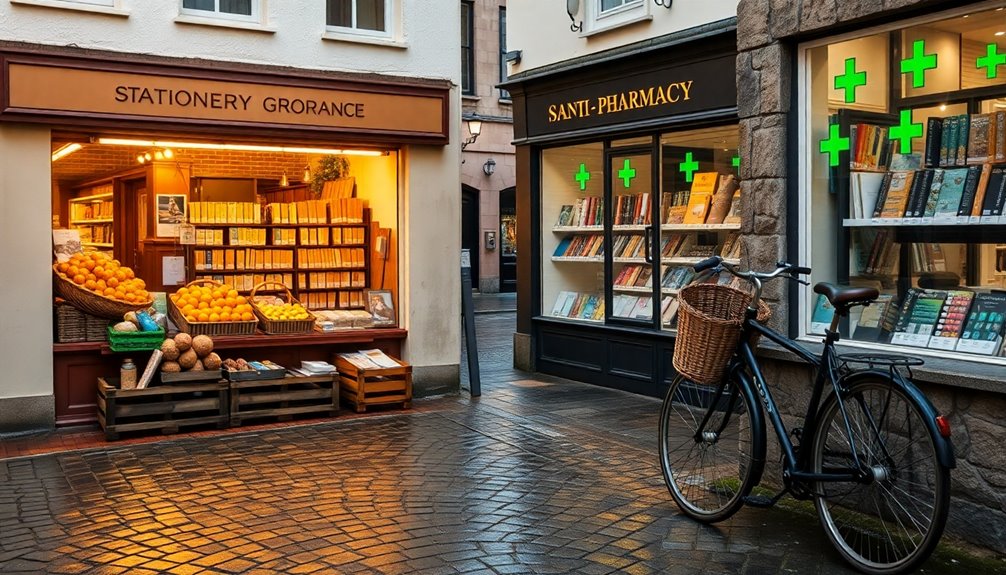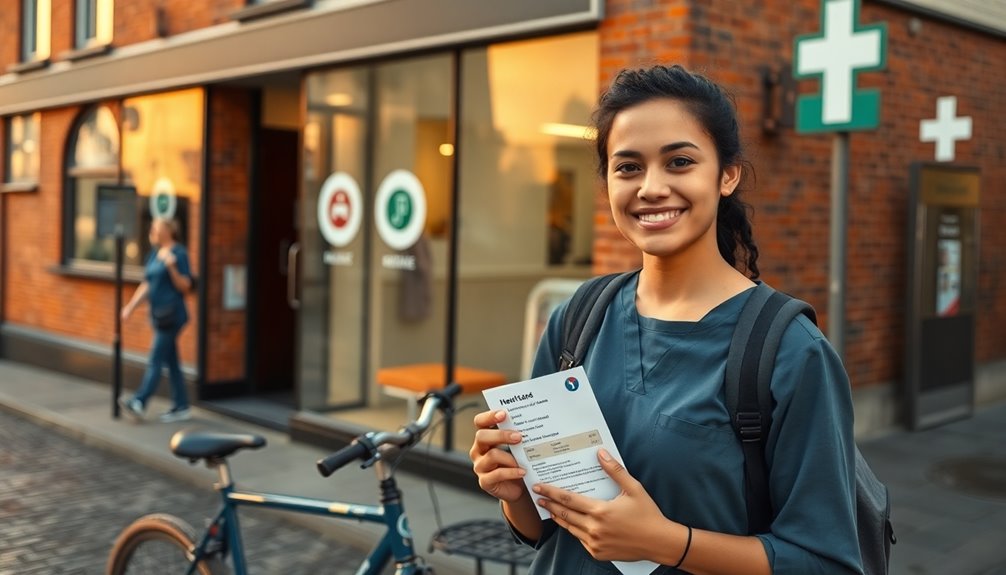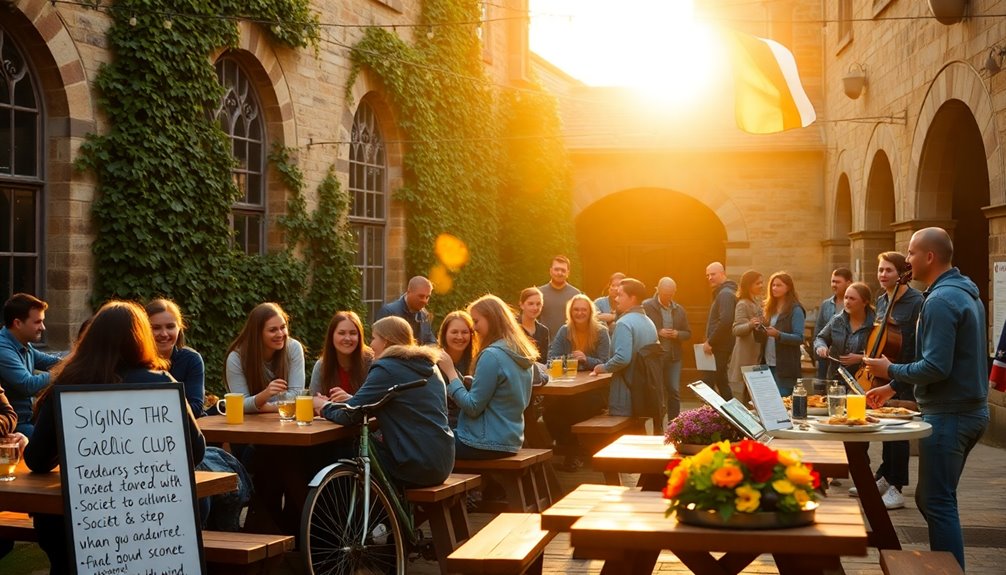
You’ll land to rain-washed streets, tram bells, and quick jokes that’ll sharpen your ear. Stay central in a student flat or short-term sublet and budget for utilities, internet, and a small emergency fund. Use a Leap card, cycle in marked lanes, and grab a local SIM for cheap data. Hit markets, cozy cafés, and student societies for real conversation practice, plus weekend trips to villages and cliffs for live language lessons — keep going and you’ll find practical tips next.
Arrival and First Impressions of the City
How does a place announce itself the moment you step off the train? You breathe it in: a mix of rain-washed streets, distant laughter, and tram bells. You notice cultural differences in small gestures—a nod, the quick joke, the way shopkeepers stack pastries—and you feel permission to move freely through it. The city atmosphere wraps around you without demanding anything; it invites curiosity. You follow cobbled alleys, let accents guide you, and keep your plans loose so surprises can shape your day. You’re keen to learn, not to be boxed in, so you let conversations start naturally. By evening, the skyline and a pub’s warm light tell you you’re exactly where you wanted to be.
Finding Affordable Student Accommodation
Where do you even start when your budget is as tight as your schedule? You want freedom to explore, so pick student housing that’s simple, central, and flexible. Prioritize affordability without locking yourself into long leases; short-term sublets and university dorms can free you to move or extend as you wish. Keep rental budgeting realistic: include utilities, internet, and a small buffer for emergencies. Inspect rooms quickly but thoroughly, ask about bills upfront, and trust your instincts about neighborhood safety and vibe.
- Compare listings and ask for bills-included options.
- Consider flatshares to cut costs and gain instant community.
- Negotiate lease terms and plan a clear exit strategy.
Navigating Public Transport and Bike Routes
You’ll save time and money once you get the hang of Dublin Bus routes and Leap card fares, so start by mapping common stops near your classes. For shorter trips, consider cycling but stick to marked bike lanes and wear a helmet. Ask locals about tricky junctions and safe times to ride.
Dublin Bus Tips
If you’re getting around Dublin this summer, the bus network and bike routes make it easy to cover the city without a car. You’ll want to learn Dublin bus routes and check bus fares in advance so you can move freely and save time. Buses are frequent on main corridors; keep a Leap card for cheaper fares and tap on/off.
- Plan — use the app to find routes and real-time arrivals, so you’re never stuck waiting.
- Pay smart — Leap card or contactless beats cash and speeds your trip.
- Board confidently — enter at the front, give space to locals, and sit near exits if you value quick departures.
These tips keep you independent and ready to explore.
Cycling Path Safety
Wondering how to juggle Dublin’s buses and bike routes safely? You’ll want clear rules so your freedom on two wheels feels effortless. Keep to marked lanes, signal early, and respect pedestrians — that’s core cycling etiquette. When a bus approaches, stay visible and avoid sudden moves; buses have wide sweeps. Lock your bike in designated racks and carry minimal gear so you can hop on and off transport fast. Learn bus-bike policies ahead of time; some routes allow folded bikes, others don’t. Trust your instincts but follow local rules: helmets, lights at dusk, and reflective clothing boost bicycle safety without restricting your roam. With respect and confidence, you’ll move freely across Dublin’s streets.
Local SIM Cards, Banking, and Money Tips
Anyone traveling for a summer stay should sort out local SIMs and banking early so you won’t waste time or lose money later; get a prepaid SIM at the airport or a nearby shop, bring ID for registration, and set up a bank or card option that minimizes fees and supports contactless payments. You’ll want freedom to explore without worrying about hidden charges: check local banking options, pick a card with low foreign transaction fees, and know the best places for fair currency exchange. Keep cash for markets but rely on contactless where possible. Consider mobile banking apps for quick transfers and budgeting. Tips:
- Compare prepaid plans for data and roaming.
- Use a no-fee travel card.
- Keep ID and emergency cash secure.
Essential Shops: Groceries, Stationery, and Pharmacies

You’ll want to know where to buy groceries, basic pharmacy items, and any stationery you might need while you’re here. Check out local markets for fresh produce, neighborhood supermarkets for groceries, and small pharmacies for OTC meds and toiletries. For notebooks, pens, and chargers, look for stationery shops near schools or transit hubs.
Where to Buy Groceries
Where can you find the essentials during your stay? You’ll want to mix convenience with discovery: grocery stores cover your staples, while local markets give you seasonal produce and friendly bartering vibes. You’ll grab bread, milk, and ready meals at supermarkets, then wander stalls for fresh fruit, cheese, and artisan treats that make cooking feel like play.
- Supermarkets — quick, reliable, open late for spontaneous plans.
- Local markets — vibrant, cheaper seasonal finds, perfect for meeting makers.
- Mini-shops & corner stores — great for late-night needs and small splurges.
Embrace freedom: choose routine when useful, explore when curious, and let food shopping become part of your Irish adventure.
Pharmacies and Essentials
After you’ve stocked the kitchen, it’s smart to locate nearby pharmacies and shops for the little things that keep daily life running smoothly. You’ll find local pharmacies offering friendly pharmacy services, over-the-counter remedies, and basic toiletries so you won’t be tethered to big supermarkets. Pick up essential medications, bandages, or sunscreen between classes or trips without fuss. Stationery shops are tiny freedom hubs — grab notebooks, adapters, or a cheap umbrella and get back to exploring. Learn opening hours and whether a pharmacy dispenses prescriptions late; some stay open longer in town centers. Keeping a small list of trusted shops helps you move freely, solve small problems fast, and focus on language practice and spontaneous adventures.
Health Services and Student Insurance Advice

Need help maneuvering health services and student insurance while you’re abroad? You’ll want clear steps so you can explore freely without worry. Understand what local health services provide and how they differ from home; keep cards and emergency numbers handy. Confirm your insurance coverage limits, excesses, and approved providers before you travel.
- Register: find a nearby GP or walk-in clinic, learn hours, and note urgent care options.
- Document: carry digital and physical copies of your insurance policy, prescription list, and emergency contacts.
- Claim: know the process for paying upfront vs. reimbursement, and keep receipts and referral notes.
Be proactive, ask questions, and choose plans that let you roam Ireland with confidence.
Language Schools, Class Formats, and Placement Tests
Choosing the right language school shapes your daily routine and progress, so look for programs that match your goals, schedule, and learning style. You’ll want a school offering language immersion and flexible class formats—group, one-to-one, and workshop-style—so you can balance study with exploration. Placement tests quickly place you where you’ll thrive; they’re usually online or in-person and focus on speaking and comprehension. Seek schools that value cultural exchange, letting you practice with locals and fellow travelers. Here’s a quick comparison to guide choices:
| Format | Best for |
|---|---|
| Group classes | Social practice, budget-friendly |
| One-to-one | Rapid progress, tailored goals |
| Workshops | Skills focus, active learning |
| Online options | Freedom, flexible schedule |
Food, Cafés, and Student-Friendly Eateries
You’ll find plenty of budget-friendly cafés just off campus where coffee and sandwiches won’t eat your study fund. Try a few places that stay open late so you’ve got somewhere to grab a bite after evening classes. I’ll share favorites for cheap meals and reliable late-night student eats next.
Budget-Friendly Cafés Nearby
Looking for a cozy spot that won’t empty your wallet? You’ll find pocket-friendly gems where you can study, chat, or just savor freedom with a good brew. Seek out affordable eats and vibrant coffee shops near campus — they’re social hubs that won’t chain you to costly meals. Try these options for quick decisions:
- A sunny café with student discounts and fresh sandwiches.
- A minimalist coffee shop offering loyalty cards and grab-and-go pastries.
- A communal spot with plug sockets, quiet corners, and budget-friendly soups.
You can roam between spots depending on mood: solo study, group practice, or relaxed people-watching. These cafés let you control your day without breaking the bank, making language practice feel easy and spontaneous.
Late-Night Student Eats
When the campus goes quiet but your stomach doesn’t, late-night student eats can rescue study sessions and social hangs with affordable, hearty options—think 24-hour diners, food trucks parked near dorms, and cafés that stay open for last-minute coffee runs and pastry grabs. You’ll roam for midnight snacks and comfort food that fuel freedom: loaded fries, warm rolls, and cheap espresso. Pick spots with plug sockets and roomy tables so you can work or laugh without rules. Share a tray, swap language tips, then wander back under streetlights. Quick, honest menus let you choose fast. Below’s a snapshot to guide your nightly cravings.
| Spot | What to expect |
|---|---|
| Diner | Hearty plates, late hours |
| Truck | Fresh, mobile comfort food |
| Café | Coffee, pastries, plugs |
| Bakery | Warm rolls, budget treats |
Part-Time Work, Internships, and Volunteering Options
If you want to accelerate your language skills this summer, part-time work, internships, and volunteering give you real-world practice and a chance to build your resume at the same time. You’ll find language exchange meetups and flexible job opportunities in cafes, hostels, and local shops that let you practice casually while keeping your schedule loose. Internships can offer focused skill growth if you want structure without feeling trapped, and volunteering gives meaningful interaction with communities.
- Find short shifts or project-based internships to keep freedom.
- Combine volunteering with language exchange for deeper practice.
- Use local noticeboards and online groups to spot varied job opportunities quickly.
Social Life: Clubs, Meetups, and Student Societies

Since social connections speed up language learning, join clubs, meetups, and student societies that match your interests so you’ll practice naturally while having fun. You’ll find low-pressure language exchange nights, book clubs, and sports teams where conversation flows between classes or rehearsals. Pick groups that let you drop in, so your schedule stays flexible and spontaneous — you want freedom, not obligation. At cultural events hosted by societies, you’ll hear accents, try foods, and learn slang in context. Volunteer roles in clubs give purpose and practical speaking time. Aim for variety: a hobby group for relaxed chats, a debate or theater society for bold speaking, and regular language exchange for targeted practice. Balance socializing with solo study to keep momentum.
Weekend Trips and Cultural Must-Sees
Weekend getaways are fast, fun ways to turn classroom learning into real-world practice. You’ll want to chase spontaneous drives to coastal villages, wander markets during cultural festivals, and linger at historical landmarks to hear stories and pick up local phrases. Freedom means choosing bite-sized adventures that recharge you and sharpen speaking skills.
Weekend getaways turn classroom lessons into lively practice—spontaneous drives, market wanders, and landmark chats that sharpen speaking skills.
- Galway: street music, festivals, and friendly cafés for conversation practice.
- Cliffs of Moher: dramatic views, short hikes, and quick chats with guides.
- Dublin: museums, historical landmarks, and pubs where locals teach slang.
Pack light, trust your curiosity, and let unplanned detours teach you. These short trips help you connect language to place, meet new people, and keep your summer moving.
Some Questions Answered
How Do I Handle Homesickness While Studying Abroad?
Brave beginnings bring balance: you’ll build coping strategies, bond with peers, and breathe freely. Tap emotional support—call home, join groups, explore solo, set routines, and savor small successes so you’ll feel steadier, more independent, and supported.
Can I Extend My Visa if I Want to Stay Longer?
Yes — you can explore visa extension options; you’ll review eligibility, gather documents, and follow the application process, staying proactive and independent while submitting forms early, meeting requirements, and seeking official guidance to maximize your freedom to remain.
Are There Student Discounts for Cultural Events and Transport?
Yes — you’ll find student discounts for cultural events and transport; many venues, museums, theaters and transit systems offer reduced fares or special rates, so grab your student ID, explore freely, and enjoy more for less.
What Safety Precautions Should I Take During Night Outings?
You’ll be fine if you stay aware — stick to well-lit areas, travel with friends, share your location, carry a charged phone, know local emergency numbers, trust your instincts, avoid excessive drinking, and plan routes in advance for nighttime safety.
How Do I Ship Personal Belongings Back Home Cheaply?
You can save by comparing shipping options — economy mail, freight, or consolidated couriers — and using smart packing tips: compressing, culling, labeling, and choosing off-peak pickup. You’ll stay flexible and keep costs low.
